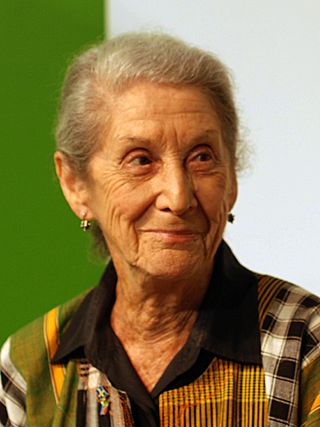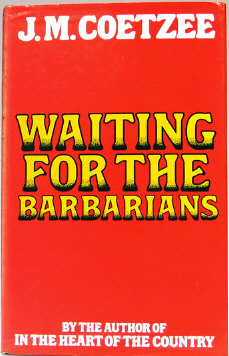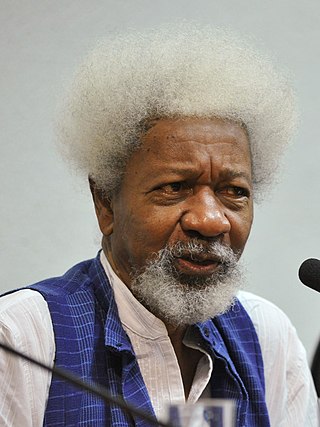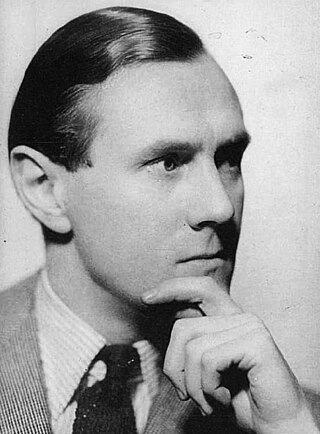
Nadine Gordimer was a South African writer and political activist. She received the Nobel Prize in Literature in 1991, recognized as a writer "who through her magnificent epic writing has ... been of very great benefit to humanity".

John Maxwell Coetzee OMG is a South African–Australian novelist, essayist, linguist, translator and recipient of the 2003 Nobel Prize in Literature. He is one of the most critically acclaimed and decorated authors in the English language. He has won the Booker Prize (twice), the CNA Prize (thrice), the Jerusalem Prize, the Prix Femina étranger, and The Irish Times International Fiction Prize, and holds a number of other awards and honorary doctorates.

John Robin Warren is an Australian pathologist, Nobel Laureate and researcher who is credited with the 1979 re-discovery of the bacterium Helicobacter pylori, together with Barry Marshall. The duo proved to the medical community that the bacterium Helicobacter pylori is the cause of most peptic ulcers.

Waiting for the Barbarians is a novel by the South African writer J. M. Coetzee. First published in 1980, it was chosen by Penguin for its series Great Books of the 20th Century and won both the James Tait Black Memorial Prize and Geoffrey Faber Memorial Prize for fiction. American composer Philip Glass has also written an opera of the same name based on the book which premiered in September 2005 at Theater Erfurt, Germany.

Dusklands (1974) is the debut novel by J. M. Coetzee, winner of the 2003 Nobel Prize in Literature. The novel consists of two separate stories, "The Vietnam Project" and "The Narrative of Jacobus Coetzee."

Foe is a 1986 novel by South African-born Nobel laureate J. M. Coetzee. Woven around the existing plot of Robinson Crusoe, Foe is written from the perspective of Susan Barton, a castaway who landed on the same island inhabited by "Cruso" and Friday as their adventures were already underway. Like Robinson Crusoe, it is a frame story, unfolded as Barton's narrative while in England attempting to convince the writer Daniel Foe to help transform her tale into popular fiction. Focused primarily on themes of language and power, the novel was the subject of criticism in South Africa, where it was regarded as politically irrelevant on its release. Coetzee revisited the composition of Robinson Crusoe in 2003 in his Nobel Prize acceptance speech.

The 2010 Nobel Prize in Literature was awarded the Peruvian writer Mario Vargas Llosa "for his cartography of structures of power and his trenchant images of the individual's resistance, revolt, and defeat." The prize was announced by the Swedish Academy on 7 October 2010. He is the first Nobel laureate in Literature from Peru and the fifth Latin American to become one after 1982 Colombian laureate Gabriel García Márquez and 1971 Chilean laureate Pablo Neruda.

The 1982 Nobel Prize in Literature was awarded to the Colombian writer Gabriel García Márquez (1927–2014) "for his novels and short stories, in which the fantastic and the realistic are combined in a richly composed world of imagination, reflecting a continent's life and conflicts."

The 2017 Nobel Prize in Literature was awarded to the British novelist Kazuo Ishiguro "who, in novels of great emotional force, has uncovered the abyss beneath our illusory sense of connection with the world." The prize was announced by the Swedish Academy on 5 October 2017.

The 2006 Nobel Prize in Literature was awarded to the Turkish writer Orhan Pamuk "who in the quest for the melancholic soul of his native city has discovered new symbols for the clash and interlacing of cultures."

The 2021 Nobel Prize in Literature was awarded to the Tanzanian-born British novelist Abdulrazak Gurnah who the Swedish Academy members praised "for his uncompromising and compassionate penetration of the effects of colonialism and the fate of the refugee in the gulf between cultures and continents." The winner was announced on October 7, 2021, by Mats Malm, permanent secretary of the Swedish Academy.

The 1972 Nobel Prize in Literature was awarded to the German author Heinrich Böll (1917–1985) "for his writing which through its combination of a broad perspective on his time and a sensitive skill in characterization has contributed to a renewal of German literature." Böll is the fifth German author to be recipient of the prize.

The 2014 Nobel Prize in Literature was awarded to the French novelist Patrick Modiano "for the art of memory with which he has evoked the most ungraspable human destinies and uncovered the life-world of the occupation." He became the 15th Frenchman to receive the Nobel Prize for Literature after J. M. G. Le Clézio in 2008.

The 2008 Nobel Prize in Literature was awarded to the French novelist Jean-Marie Gustave Le Clézio, better known with his pen name J. M. G. Le Clézio, as an "author of new departures, poetic adventure and sensual ecstasy, explorer of a humanity beyond and below the reigning civilization." He became the 14th French-language author to receive the Nobel Prize for Literature after Claude Simon in 1985 and was followed later by Patrick Modiano in 2014.

The 2007 Nobel Prize in Literature was awarded to the British novelist Doris Lessing (1919–2013) as "that epicist of the female experience, who with scepticism, fire and visionary power has subjected a divided civilisation to scrutiny." Lessing was the oldest person ever, at age 88, to receive the Nobel Prize in Literature followed by the German historian Theodor Mommsen, who received the prize at age 85. She is also the third-oldest Nobel laureate in any category. She became the 11th woman to be awarded the prize.

The 1991 Nobel Prize in Literature was awarded to the South African activist and writer Nadine Gordimer (1923–2014) "who through her magnificent epic writing has – in the words of Alfred Nobel – been of very great benefit to humanity." She is the 7th female and first South African recipient of the prize followed by J. M. Coetzee in 2003.

The 2000 Nobel Prize in Literature was awarded to the Chinese émigré writer Gao Xingjian "for an æuvre of universal validity, bitter insights and linguistic ingenuity, which has opened new paths for the Chinese novel and drama." He is the first Chinese recipient of the prize followed by Mo Yan in 2012.

The 1986 Nobel Prize in Literature was awarded to the Nigerian writer Wole Soyinka "who in a wide cultural perspective and with poetic overtones fashions the drama of existence." He is the first African recipient of the prize.

The 1973 Nobel Prize in Literature was awarded to the Australian writer Patrick White (1912–1990) "for an epic and psychological narrative art which has introduced a new continent into literature." He is the first and the only Australian recipient of the prize.


















